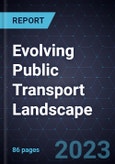Digitization, Integrated Mobility, and Equity to Ensure Future Growth Potential of $542.2B by 2030
Public transportation plays a crucial role in addressing the challenges of urban mobility, sustainability, and connectivity. Across the world, various emerging trends are shaping the future of public transportation systems. This study explores some of these key trends, highlighting their potential impact on transportation networks and the overall passenger experience.
One prominent trend is the integration of technology and data-driven solutions. Intelligent transportation systems are being adopted to optimize operations, improve service reliability, and enhance the overall efficiency of public transportation. Real-time passenger information systems, mobile apps, and smart ticketing solutions enable travelers to access up-to-date information, plan their journeys, and seamlessly pay for fares. Cutting-edge technologies, such as artificial intelligence, data analytics, and the Internet of Things (IoT), are revolutionizing the transportation landscape by optimizing it and enabling a more connected and efficient mobility ecosystem.
Another important trend is the focus on sustainability and electrification. With increasing concerns about climate change and air pollution, public transportation systems are transitioning towards greener and more sustainable options. Electrification of buses and trains, along with the integration of shared mobility services, such as micro-mobility sharing and DRT, provides additional eco-friendly transportation options.
Mobility-as-a-Service (MaaS) is also gaining traction. Through a single app or platform, travelers can plan, book, and pay for their entire journey, combining multiple modes such as public transport, ride sharing, bike sharing, and even micro-mobility options. MaaS holds the potential to enhance the overall travel experience, increase ridership, and reduce private car usage by offering personalized, on-demand transportation solutions. Consumer preferences are shifting towards mobility options that offer flexibility and personalized experiences.
Research Scope
This study is focused on analyzing the key trends shaping the public transport landscape across North America, Europe, APAC, and the Rest of the World which includes UAE, South Africa, and LATAM. The public transport market is estimated to exceed $540 billion by 2030, driven by advancements in technology, sustainability goals, passenger-centric approaches, and collaborative efforts. The integration of technology, sustainable practices, and MaaS platforms are reshaping the way people travel, making public transportation more efficient, accessible, and environment-friendly.
Research Highlights
- Strategic imperatives and growth environment
- Key industry drivers and challenges
- Competitive benchmarking of the public transport operators in each region
Key Issues Addressed
- What are the key trends that will drive the public transport landscape?
- The size of the public transport market at a global and a regional level
- What strategies can make public transport successful?
- Key elements of an evolving public transport landscape?








